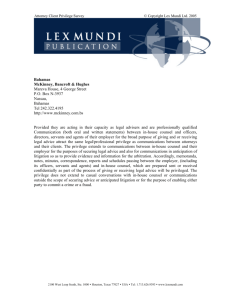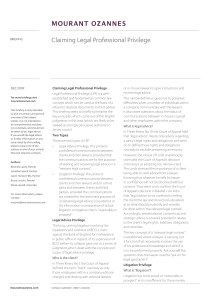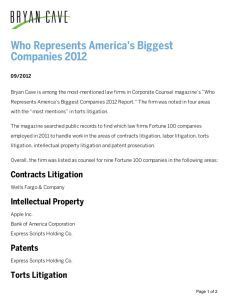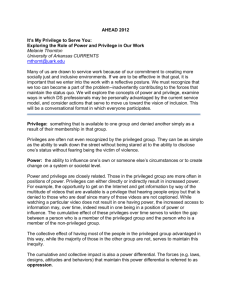as pdf - Linklaters
advertisement
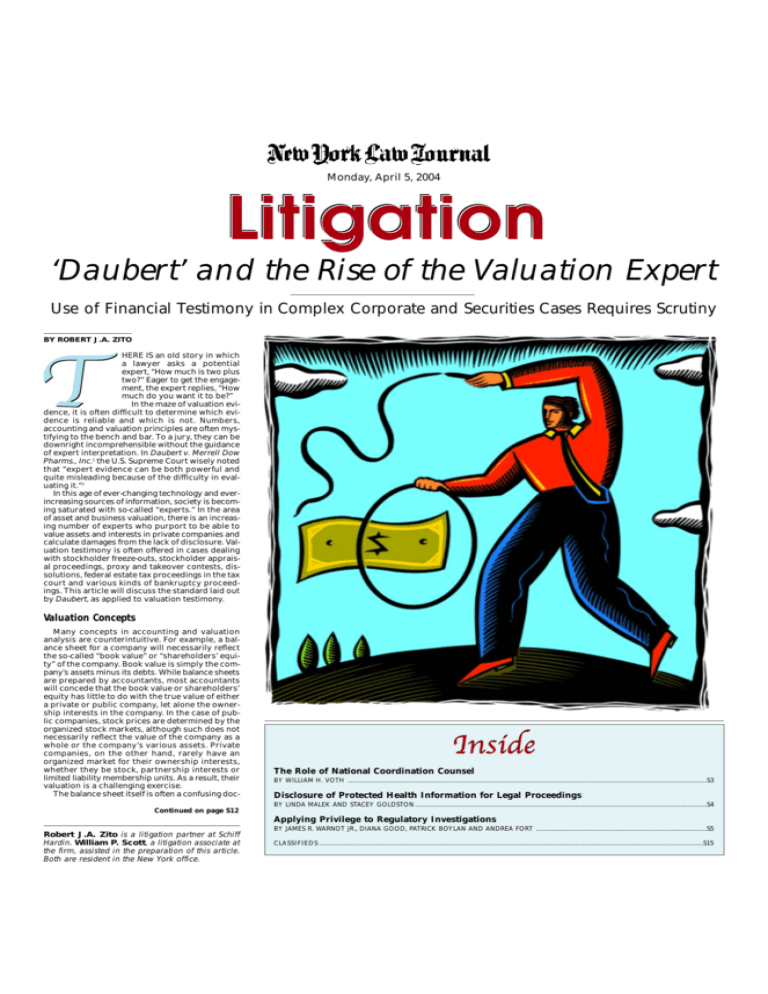
Monday, April 5, 2004 ‘Daubert’ and the Rise of the Valuation Expert Use of Financial Testimony in Complex Corporate and Securities Cases Requires Scrutiny BY ROBERT J.A. ZITO HERE IS an old story in which a lawyer asks a potential expert, “How much is two plus two?” Eager to get the engagement, the expert replies, “How much do you want it to be?” In the maze of valuation evidence, it is often difficult to determine which evidence is reliable and which is not. Numbers, accounting and valuation principles are often mystifying to the bench and bar. To a jury, they can be downright incomprehensible without the guidance of expert interpretation. In Daubert v. Merrell Dow Pharms., Inc.1 the U.S. Supreme Court wisely noted that “expert evidence can be both powerful and quite misleading because of the difficulty in evaluating it.”2 In this age of ever-changing technology and everincreasing sources of information, society is becoming saturated with so-called “experts.” In the area of asset and business valuation, there is an increasing number of experts who purport to be able to value assets and interests in private companies and calculate damages from the lack of disclosure. Valuation testimony is often offered in cases dealing with stockholder freeze-outs, stockholder appraisal proceedings, proxy and takeover contests, dissolutions, federal estate tax proceedings in the tax court and various kinds of bankruptcy proceedings. This article will discuss the standard laid out by Daubert, as applied to valuation testimony. Valuation Concepts Many concepts in accounting and valuation analysis are counterintuitive. For example, a balance sheet for a company will necessarily reflect the so-called “book value” or “shareholders’ equity” of the company. Book value is simply the company’s assets minus its debts. While balance sheets are prepared by accountants, most accountants will concede that the book value or shareholders’ equity has little to do with the true value of either a private or public company, let alone the ownership interests in the company. In the case of public companies, stock prices are determined by the organized stock markets, although such does not necessarily reflect the value of the company as a whole or the company’s various assets. Private companies, on the other hand, rarely have an organized market for their ownership interests, whether they be stock, partnership interests or limited liability membership units. As a result, their valuation is a challenging exercise. The balance sheet itself is often a confusing doc- The Role of National Coordination Counsel BY WILLIAM H. VOTH ..........................................................................................................................................................................................................S3 Disclosure of Protected Health Information for Legal Proceedings BY LINDA MALEK AND STACEY GOLDSTON ....................................................................................................................................................................S4 Continued on page S12 Applying Privilege to Regulatory Investigations Robert J.A. Zito is a litigation partner at Schiff Hardin. William P. Scott, a litigation associate at the firm, assisted in the preparation of this article. Both are resident in the New York office. BY JAMES R. WARNOT JR., DIANA GOOD, PATRICK BOYLAN AND ANDREA FORT ................................................................................................S5 CLASSIFIEDS ........................................................................................................................................................................................................................S15 Monday, April 5, 2004 NEW YORK LAW JOURNAL S5 Applying Privilege to Regulatory Investigations Developments in the UK Highlight Variations With U.S. Over Protection of Communications BY JAMES R. WARNOT JR., DIANA GOOD, PATRICK BOYLAN AND ANDREA FORT ECAUSE OF THE shared origins and many similarities between the U.S. and UK legal systems, there is a common perception that the laws on attorneyclient privilege and work product protection in the two jurisdictions are broadly similar and cover the same types of communications. While this may be true in a very general sense, companies operating in both jurisdictions need to be aware of the significant differences in this area of law. This is particularly true following recent judgments of the Court of Appeal in London indicating that the availability of privileges may be increasingly limited, particularly in the context of regulatory investigations. Overview of the Two Privileges In the U.S., the attorney-client privilege protects confidential communications between an attorney and client made in the course of legal representation. The privilege applies equally to outside and in-house counsel when providing legal advice, though communications by in-house counsel acting in a business advisory role will not be protected.1 The attorney-client privilege is exceedingly broad and covers all confidential communications between an attorney and her client. The work product doctrine is broader in certain respects and can be used to prevent disclosure of documents and tangible things prepared in anticipation of litigation by a party or a party’s representative. The classic example is an attorney’s notes of his interview with a witness, which was the scenario in which the U.S. Supreme Court established the work product doctrine in Hickman v. Taylor.2 “Fact work product,” materials including an attorney’s organization of factual material, interview notes, and the like, may be discoverable if a party shows a substantial need for the materials and cannot procure them elsewhere without undue hardship.3 “Opinion work product,” an attorney’s mental impressions and opinions, is generally protected without limitation, however.4 Litigation need not have actually been commenced in order for work product protection to apply, as long as it was reasonable to believe that litigation was a reasonable possibility.5 In the U.S., it is presumed that both attorney-client privilege and work product protection are available in regulatory investigations, although there is tremendous pressure by the regulators to waive privileges. James R. Warnot Jr. is a partner in the Litigation Department in the New York office of Linklaters, and Diana Good is a partner in the Litigation Department in the firm’s London office. Patrick Boylan and Andrea Fort are associates in the firm’s London and New York offices, respectively. In the UK, the work product and attorney-client privileges are known as litigation and legal advice privilege, respectively. Litigation privilege applies to documents and other communications created for the purpose of obtaining legal advice or gathering evidence in connection with litigation proceedings. Whether litigation privilege may be asserted in regulatory investigations is unclear, and until case law is created on this point there remains doubt that this will be the case. In 1997, the House of Lords, England’s highest court, in a family law case found that litigation privilege was an essential part of adversarial litigation procedure because it afforded protection to both sides.6 The Lords further stated that the notion of a fair trial between opposing parties will assume far less importance in pro- ceedings that are primarily non-adversarial and investigative. In light of this language, there is a risk that litigation privilege may eventually be held not to extend to regulatory or other types of inquisitorial investigations. Two recent decisions by the English Court of Appeal7 have significantly Continued on page S10 S10 NEW YORK LAW JOURNAL Monday, April 5, 2004 Privilege Issues in UK and U.S. Continued from page S5 reduced the scope of legal advice privilege. Until these decisions, the general view in the UK, as is the case here, was that legal advice privilege extended to all communications between lawyer and client relating to matters within the ordinary scope of the lawyer/client relationship, as well as to documents created by the client (but not a third party) for assisting in the giving or receiving of legal advice. This included materials prepared by employees of corporate clients that are intended to provide information necessary for the lawyers to conduct their work. The previous view concerning the similarity between the systems no longer holds following the recent decisions by the Court of Appeal in the case known as Three Rivers. The ‘Three Rivers’ Decisions Three Rivers arose from the collapse of the Bank of Credit & Commerce International (BCCI). The UK government established a non-statutory board of inquiry, led by Lord Justice Bingham, to investigate the collapse of BCCI and to provide recommendations on the future regulation of the financial sector. This type of inquiry is distinct from a regulatory investigation required or permitted by statute. The Bank of England, the central bank of the UK, retained outside lawyers to assist it in the inquiry and established a three-member group of employees known as the Bingham Inquiry Unit (BIU) to be the primary liaison with these lawyers. BCCI’s liquidators and various creditors, including the named plaintiffs, subsequently brought a lawsuit against the Bank of England for misfeasance in public office in its role as BCCI’s regulator. The plaintiffs sought discovery of numerous categories of documents prepared in connection with the Bingham inquiry, although they did not seek communications between the BIU and outside counsel. The defendants accepted that litigation privilege was not applicable and relied only on legal advice privilege. The disputed categories of documents were those prepared by current and former Bank employees with the intention that they be provided to outside counsel. In its April 2003 decision, 8 the Court of Appeal ruled that none of the disputed documents were privileged. The holding of the court was that legal advice privilege covers only communications between a client and its lawyer for the purpose of obtaining legal advice. This in itself is not particularly controversial. In applying this ruling, however, the court held that only the BIU was the client for purposes of the privilege, and therefore found that documents produced by other Bank employees were not privileged. As to communications between the clients (the BIU in this case) and lawyer, the Court of Appeal accepted the broader definition of com- munication that it set forth in an earlier case in 1988, Balabel v. Air India.9 In that case, the court held that the protection afforded to communications extended not only to the actual communications containing or seeking legal advice, but also to preparatory and other documents which came within the necessary “continuum of communication” between lawyer and client. Under this reasoning, once the client is properly identified, any necessary preparatory documents created by that client should be privileged. However, the classes of documents that the Court of Appeal ordered to be disclosed also included documents created by the BIU, as well as documents created by other Bank of England employees. No discussion or guidance was provided by the Court of Appeal as to why BIU-generated preparatory documents, were not privileged. Moreover, in rejecting privilege for documents created by other Bank employees based on 19th-century authority,10 the court rejected the argument that corporations act only through their employees. It is difficult to reconcile the court’s holding with the realities of modern business practice. Despite Balabel, which has not been overruled, there is now uncertainty as to which client-generated preparatory documents will attract privilege. The first Three Rivers judgment contained dicta that the dominant purpose of the disputed documents was not to obtain legal advice but to assist outside counsel in crafting the Bank’s presentation to the inquiry. Emboldened by this dicta , BCCI’s liquidators subsequently sought disclosure of communications passing between the BIU and outside counsel. In its most recent Three Rivers decision on March 1, 2004, the Court of Appeal held that those communications were not privileged either because they were communications prepared for the dominant purpose of giving presentational advice, rather than legal advice.11 Moreover, in the penultimate paragraph of its judgment the court suggested that attorney-client communications should not be privileged at all unless litigation is anticipated, and suggested that the British Law Reform Committee should consider this issue. The end result of the Three Rivers decisions is significant uncertainty as to the scope of legal advice privilege and certainly a reduction in that scope. There have been suggestions that the limitations imposed on the identity of the client for privilege purposes can be remedied by a broad definition in an engagement letter. It is uncertain, however, whether the courts will follow that definition or instead restrict “clients” for purposes of the privilege to those employees dealing directly with outside lawyers. Moreover, the court’s decisions require line-drawing between “presentational” advice and advice on rights and obligations. The location of that line, which will be determined subsequently by courts, is not at all clear. The effects of this new restrictive NEW YORK LAW JOURNAL Monday, April 5, 2004 approach as to what constitutes legal advice are already being felt. In a subsequent judgment in USA v. Philip Morris, handed down last month, on March 23,12 the Court of Appeal has ordered that an English lawyer answer questions on document retention advice he gave to a tobacco company. The court accepted that advice on the law relating to privilege or disclosure of documents would probably be privileged, but that advice on the practical aspects of a document retention policy might not amount to advice concerning legal rights and obligations. With that guidance, the court ordered the testimony to proceed. Finally, should the Law Reform Committee be called on to examine this area and should it subsequently accept the court’s invitation to exclude from the privilege advice on transactions, attorneys and clients will have to re-examine the way they have ordered their affairs for centuries. Three Rivers and the following judgment in Philip Morris create significant problems for companies operating in England. These problems are not necessarily confined within the borders of the UK, given the differing rules on privilege waiver. Cross-Border Implications In the UK, selective waiver will generally not result in loss of the privilege as to other parties provided that the document has not entered the public domain and remains confidential. Thus, disclosure in a confidential regulatory investigation or under confidentiality provisions in civil litigation does not lead to a generalized loss of the privilege. This is not the case in the U.S., however. The majority view is that disclosure of a single privileged document to third parties, including regulators, results in a complete loss of privilege as to the entire subject matter of the privileged documents.13 As a result, disclosure of privileged documents in the UK, either compelled or otherwise, will likely lead to subject matter waiver in the U.S. This problem is compounded by the self-reporting duties of companies under the UK financial regulatory regime, which are understood to be broader than in the U.S. While financial services firms in the U.S. have similar obligations, UK requirements are principles-based (as opposed to rules-based in the U.S.), and are deliberately worded very broadly in order to place the onus on the firms involved to report any facts that regulators may in retrospect believe to be material. For example, the Financial Services Authority (FSA) Principle 11 states: “a firm must deal with its regulators in an open and co-operative way, and must disclose to the FSA anything relating to the firm of which the FSA would reasonably expect notice.” The FSA’s Supervision Manual likewise provides that a firm must notify the FSA of any matter which could have a significant adverse impact on the firm’s reputation, which “has occurred, may have occurred or may occur in the foreseeable future.” This broad self-reporting obligation may result in large numbers of documents and other privileged information being voluntarily provided to the FSA as a means of demonstrating cooperation, although there is no obligation to make disclosure, with the resulting loss of privilege in the U.S. Moreover, it would then be open to FSA in many circumstances to provide such information to the Securities and Exchange Commission (SEC) and other U.S. regulators through various existing mechanisms. This could be done either at SEC’s request or on FSA’s own instigation. For international investment banks or other international financial institutions that are subject to both SEC and FSA’s regulatory regime, this opens up the possibility of regulatory “arbitrage” by the regulators themselves. Thus, the SEC may take the opportunity to exploit the arguably wider disclosure obligations applicable in the UK by making requests for assistance to the FSA, which in turn may urge firms to provide full cooperation and assistance and make voluntary disclosure of all relevant material, which might then be turned over to the SEC by the FSA. Recent cross-border issues such as analysts’ conflicts, IPO market abuses (spinning, laddering etc.) and more recently market-timing and mutual fund abusive practices have all exposed the potential for exploitation of any regulatory imbalance. The practical implications of this regulatory imbalance may not be as severe as appears at first blush. That is because in the U.S., the availability of privileges in practice is increasingly uncertain once a company becomes the subject of a regulatory investigation. Following the rash of financial scandals that began with the collapse of Enron, U.S. regulators have been increasingly zealous in carrying out their mandates, and the fines and civil penalties imposed have dramatically increased.14 Given the potentially harsh consequences, companies coming under regulatory scrutiny may find it in their best interests to cooperate with regulators to the greatest extent possible. According to regulators, an important part of cooperation is the waiver of privileges. In 2001 the SEC announced in the Seaboard case that cooperation, including the waiver of privileges, would be a significant factor in settling charges.15 The Department of Justice has also circulated a document known as the Thompson memorandum, explicitly listing waiver of privileges as an element of cooperation in its guidelines for prosecutors.16 The result is that companies under investigation by U.S. authorities are now finding themselves in the uncomfortable position of choosing between potential disclosure of sensitive materials to third parties in civil litigation and an assertion that the company failed to cooperate with regulators. While SEC has asserted that confidential disclosures to it do not effect a general subject matter waiver, the courts have not yet accepted this view.17 Conclusion In order to preserve privilege, it is no longer sufficient simply to ensure that the corporate client is properly identified and Continued on page S15 S11 NEW YORK LAW JOURNAL Monday, April 5, 2004 Attorney-Client Classified Advertising Continued from page S11 Coordination Continued from page S9 issues in the cases, and the lines of questions that have been used should be in a better position to prepare and represent the witnesses than counsel who has a more limited involvement in a particular case or jurisdiction. Having the same counsel represent witnesses who are deposed multiple times may create a rapport that makes the deposition process smoother and the witness more comfortable. Coordination counsel may also be able to work with multiple plaintiffs’ counsel to notice and schedule depositions to limit the number of times a witness has to testify and reduce inconvenience. Depositions under Fed. R. Civ. P. 30(b)(6) or state law equivalents present additional challenges that require a coordinated response in multiple litigations. Rule 30(b)(6) deposition notices frequently demand that a company designate a witness or witnesses to testify on its behalf concerning numerous broad subjects. Frequently, these subjects are of dubious relevance, are described in vague or argumentative terms or are directed to litigation contentions and anticipated trial proof. Coordination counsel can be helpful in negotiating limitations and clarifications of the notice and, where necessary, litigating motions for protective orders that are consistent from case to case. Rule 30(b)(6) deposition notices in major litigations sometimes also seek testimony on historical matters as to which no current employee has personal knowledge. Nonetheless, some courts have said that a company must designate a witness to testify on “matters known or reasonably available to the organization.” This has been interpreted to require that the designee be prepared on those issues through documents the witness has never seen, conversations with former employees or third parties, and whatever other sources of information might exist. If the preparation and testimony are later deemed inadequate, sanctions may be imposed, including an order precluding the party from offering evidence at trial on the subject. In such circumstances, there are clear benefits to a single counsel being responsible for the difficult tasks of identifying the appropriate designee, determining what materials are available and should be used in the preparation, and working with the designee to assure adequate preparation and testimony that is consistent with the unusual role the witness is called to play. that the communications or documents sought to be protected meet the basic criteria for asserting the doctrines. In the UK, companies should seek to ensure that communications clearly relate to legal rights and obligations to the greatest extent possible in order to prevent a Three Rivers result. Clients may also opt not to reduce strategic or arguably “presentational” advice to writing. Companies with operations in both the U.S. and UK should ensure that disclosure to regulators is made on as limited a basis as possible to prevent privileges being deemed waived in potential U.S. proceedings. In the U.S., companies should carefully reflect on the potential advantages and disadvantages of the waiver of privileges as they proceed with internal investigations, since regulators are unlikely to soften their views on cooperation in the near future. The future of legal advice privilege in the UK is quite uncertain. The Bank of England has indicated that it will attempt to appeal the latest Three Rivers judgment to the House of Lords, but that application is uncertain. Moreover, it is uncertain whether the Law Reform Committee, if it reviewed the law in this area, would accept the Court of Appeal’s invitation to radically restrict the privilege. Although it is certainly evident to practitioners both here and in England, the Court of Appeal in Three Rivers stated that outside the context of litigation, “it was not easy to see why” communications between lawyer and client should be privileged. •••••••••••••• ••••••••••••••••• (1) Georgia-Pacific Corp. v. GAF Roofing Mfg Corp., 93 Civ. 5125, 1996 U.S. Distr. LEXIS 671 (S.D.N.Y. Jan. 24, 1996). (2) 329 U.S. 495 (1947). (3) Fed. R. Civ. P. 26(b)(3). (4) Id. (5) See In re Sealed Case, 146 F.3d 881, 884 (D.C. Cir. 1998). (6) Re L (a minor) [1997] AC 16. (7) In England and Wales, the Court of Appeal is the nationwide intermediate appellate court, and as a result, the Court of Appeal establishes the law of the land until such time as the House of Lords considers an issue. (8) Three Rivers District Council and others v. The Governor and Company of the Bank of England (No.5) [2003] QB1556. (9) Balabel v. Air India [1988] Ch 317. (10) Greenough v. Gaskell (1833) 1 My & K 98; Anderson v. Bank of British Columbia (1876) 2 Ch D 644; Southwark and Vauxhall Water Company v. Quick (1878) 3 QBD 315; Wheeler v. Le Marchant (1881) 17 Ch D 675. (11) Three Rivers District Council and others v. The Governor and Company of the Bank of England [2004] EWCA Civ 218. (12) USA v. Philip Morris, BAT & Others [2004] EWCA Civ 336. (13) See, e.g., In re Steinhardt Partners L.P., 9 F.3d 230 (2d Cir. 1993). There is a minority view to the contrary, but it should not be relied upon. See Diversified Industries v. Meredith, 572 F.2d 596 (8th Cir. 1998). (14) Bank of America recently agreed to a $675 million settlement in relation to charges involving afterhours trading in its mutual funds. See “The Fund Scandal’s Biggest Payout,” Wall. St. J., March 16, 2004, at C1. (15) Securities Exchange Act of 1934 Rel. No. 44969 (Oct. 23, 2001), Accounting and Auditing Enforcement Rel. No. 1470, Report of the Investigation Pursuant to Section 21(a) of the Securities Exchange Act of 1934 and Commission Statement on the Relationship of Cooperation to Agency Decisions. (16) Memorandum from Deputy Attorney General Larry D. Thompson: Principles of Federal Prosecution of Business Organizations (Jan. 20, 2003). (17) Brief of the U.S. Securities and Exchange Commission, McKesson HBOC, Inc. v. Adler, No. 99-C-79903 (Ga. Ct. App. filed May 13, 2001). Attorneys Call: (212) 545-6234 Paralegal Paralegal ASSOCIATE Garden City growing firm seeks attorney with 3+ years experience; commercial litigation/ real estate. $50K+. Fax resume 516 248-6422 ASSOCIATE Nassau malpractice defense firm seeks motivated attorneys with 5+ years litigation experience. Medical malpractice, EPL, Insurance Law a plus. Travel to all venues required. Opportunities for advancement. Good benefits package. Qualified applicants should send resume and salary requirements in confidence to Mail, Fax or Email: Box 6067 ALM 345 Park Ave. S. NY, NY 10010 212-545-6250 nyljobs@amlaw.com (Add Box # on fax & email) ATTORNEY Downtown AV rated medical malpractice defense firm seeks associate with 3-5 years experience in defense litigation. Excellent writing and research skills required. Fax resume and salary requirements to (212) 742-1471 or email resume@ggdc.com ATTORNEY NY office of a prestigious national litigation firm is seeking an associate with 5 years of commercial litigation experience. Candidate must possess a stellar background including prior experience with a major law firm. Strong writing and oral advocacy skills a must. Prior clerkship experience preferred. Excellent benefits. Salary commensurate with experience. Send resume via facsimile to: Susan McGuiness, Bickel & Brewer, 212-489-2384 or email to: smm@ bicke lbr ewer.com ATTORNEY Real Estate and Commercial Litigation. Minimum 2 years experience. Starting salary $35K. Small Brooklyn business law office. Fax resume to (718) 434-8700 LITIGATION ASSOCIATE-CT Stamford office of major Connecticut law firm seeks litigation associate with 2-5 years experience in civil litigation. Candidates must have strong academic credentials and excellent research, writing and oral communication skills. Apply in confidence to: Legal Recruiting P. O. Box 120 Stamford, CT 06904 attyjobs@cl-law.com Fax: 203-708-5637 EEO/AA Employer CLASSIFIED I N F O R M AT I O N Attorneys Attorneys Commercial Litigation Associate Prominent national construction law firm seeking an associate with 5 to 6 years complex litigation experience and excellent oral and written communication skills to join our New Jersey Office. Construction law experience preferred. NY and NJ Bar admission required. Competitive salary, benefits and bonus. Send resume in confidence via email, fax or mail to: Silvia K. Zicherman Recruiting Coordinator Peckar & Abramson, P.C. 70 Grand Avenue River Edge, NJ 07661 Fax: 201.343.6306 szicherman@pecklaw.com LOOKING FOR TEMPORARY HELP OR WORK? SEE THE CLASSIFIED PAGES. LITIGATION ATTORNEY Midtown Manhattan firm specializing in medical malpractice, toxic tort and general liability defense seeks attorney with medical malpractice experience. Send cover letter, resume and salary requirements. Mail, Fax or Email: Box 6103 ALM 345 Park Ave. S. NY, NY 10010 212-545-6250 nyljobs@amlaw.com (Add Box # on fax & email) Legal Secretaries LEGAL SECRETARY NY office of a prestigious national commercial litigation boutique is seeking a highly-qualified Legal Secretary to work for Partner and one Associate. Must have at least 5 years legal experience and be extremely organized, articulate, detail oriented and personable. Over Time required. MS Word a must. DOCS Open proficiency a preference. Excellent benefits. Salary commensurate with experience. Please email resume with salary requirements to SMM@bickelbrewer.com TO PLACE, CORRECT OR CANCEL A CLASSIFIED AD: Phone: (212)545-5999 Fax: (212)481-8075 E-mail: leonie@amlaw.com Monday, Wednesday, Friday 8:30 AM to 5:30 PM Tuesday, Thursday 8:30 AM to 7:00 PM BOX NUMBER REPLIES: To answer box number ads... (1) Seal your reply in a business size (4” by 9 1/2”) envelope please. (2) Please do not enclose writing samples unless specifically requested in the advertisement. (3) Address your envelopes to: A sales representative will confirm receipt. DEADLINES: www.law.com/ny A M E R I C A N L AW Y E R M E D I A RENEW YOUR SUBSCRIPTION BY PHONE! S15 Line Ads: Tuesday through Friday editions: 11:00 AM one day prior to publication Monday edition: Friday 12:00 Noon Display Ads: 11:00 AM two days prior to publication Box # New York Law Journal 345 Park Avenue South New York, NY 10010 ERROR RESPONSIBILITY NOTE Please check your ad the first day it appears. All ads placed by telephone are read back for verification of copy content. In the event of New York Law Journal error, we are responsible only for the first incorrect insertion. We assume no responsibility for any item error in an ad beyond the cost of the ad itself, or for the omission of copy. New York Journal reserves the right to edit, reject, cancel or correctly classify any ad.
